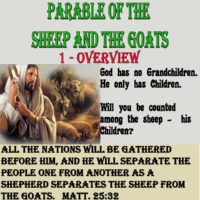

Read: Matthew 25:31-46 |
“God has no grandchildren. He only has children.” [Source: Unknown]
Thus, we as His children, cannot automatically transfer God’s salvation to others via parentage. Heaven is only for those who have personally accepted Christ. Eternal damnation in Hell is the fate of those who fail to do so. (John 3:16; I John 5:1; Exodus 32:33)
Jesus shared this parable of the Sheep and Goats just days before the Passover and the beginning of His persecution. In another part of Jerusalem, Satan was impishly fanning the flames of his bold scheme to kill Jesus using the religious leaders as his unwitting pawns. Meanwhile, standing on the Mount of Olives, Jesus still had the presence of mind to share this final prophetic parable in the midst of pending personal peril.
As He looked across eternity and upon those gathered before Him, He shared this parable to prepare us for what was to come. He explained the basis for which the righteous will be separated from the wicked after the tribulation by using the metaphor of sheep and goats.
Context
Scholars debate the setting of this parable, but many place it at the beginning of the millennium after the rapture and the 7-year tribulation.
Less debated, is the reference to “All nations …” in verse 32. In general, the term “nations” can be very confusing. It might seem that it is saying that God would bring the nations of England, Canada, China, etc. to the throne for judgment. However, no one will be sent to Hell based on their national identity. In this context, “nations” – Greek: Ethnos – has the basic meaning of “Gentile” nation. Thus, this reference is to the non-Jewish people of earth. They are the audience of sheep and goats that the King of Kings is about to judge.
Culture
The figurative reference to sheep and goats helped the audience relate to his parable since Shepherds often herded both sheep and goats.
Shepherds would let the sheep and goats graze together, during the day. However, at night, the animals had to be separated. A pen that would hold sheep, wouldn’t hold goats because goats were more resourceful and would try to make a jailbreak.
Even though goats do have some admirable traits, the metaphor of the goat for those going to Hell seems to have stuck. In countless paintings and illustrations since then, Satan is often depicted with goat horns.
Content
To make His point in this parable, Jesus did not use obviously contrasting metaphors such as sheep and wolves. This would lead to a more obvious interpretation of those who believe and those who oppose. Instead, He uses sheep and goats who are part of the same flock any shepherd would want to keep.
In this light, both “appear” to belong to God. But, just as in His parable of Tares and Wheat, Jesus is able to separate the hypocrites from the sincere. The saints from the saint-like. The righteous from the right-looking. The true believers will be ushered into the kingdom and the “others” into eternal punishment (Matt. 25:46).
Jesus said the greatest commandment is to love God with all of our hearts, soul and mind. The second is to love our neighbors as ourselves. [Matthew 22:38]. In this parable of Sheep and Goats, He appears to use this commandment as His scale for how He judges the “nations”.
The sheep, true followers of Christ, will treat others with kindness, serving them as if they were serving Christ Himself. Good works will be a by-product of their faith in God.
The unregenerate “goats” can indeed perform acts of kindness and charity. However, their hearts are not right with God, and their actions are not for the right purpose – to honor and worship God.
So, for the next few weeks as God leads we’ll look at: Is your Service to God more “Sheep-like” or “Goat-like”?
Questions:
1. Discover –
A. This week, while praying and studying over this scripture I was at a stoplight when a man walked by with a sign “Need money for food and clothes”. I diverted my eyes. Just as he passed by, the Holy Spirit convicted me by replaying this text from Matthew. Needless to say, I was miserable because he was too far away to get his attention. How do you handle lost opportunities to serve God? Does it cause you any pain or regret?
B. If you do not give to beggars on the side of the road, does that mean that you are “goat-like” or just being a prudent Christian?
2. Develop –
A. How do you know “when” to love your neighbor as yourself and when to keep on walking because you “can’t save everybody”?
B. Are you a child of God? What circumstances led you to accept Christ in your heart? Since then, have you led anyone else to Christ to become a child of God as well?
3. Demonstrate –
A. Does your walk with God clearly demonstrate someone living out the greatest commandment?
